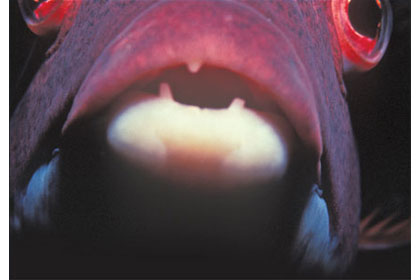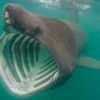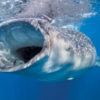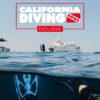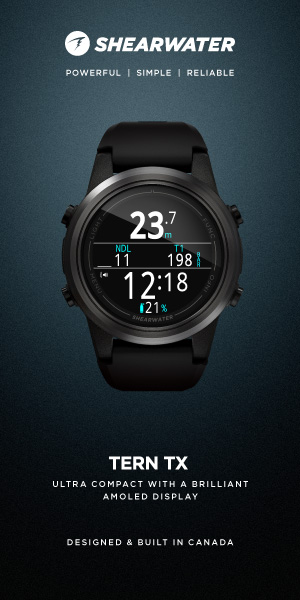Probably the most amazing thing about the jobs people have who work in diving is that their careers are so varied. Pick a type of job, and there is probably someone who specializes in using diving in that job. There are doctors who specialize in diving medicine, lawyers who specialize in diving litigation, archaeologists who specialize in maritime archaeology, and the list goes on in many categories.
As we traveled across California (as well as out of state) interviewing and filming professional divers we were struck by the enthusiasm that was universally present in each person who has made diving part of their work. It took us more than a year to interview and dive with each person on the job. In no case did we meet anyone who said that they would rather be doing something else.
Diving Equipment Marketing
Renee Pelissier Nelson works for Ocean Technology Systems (OTS), a company that manufactures underwater communications equipment for sport, technical, scientific, law enforcement, military, and commercial divers. The company makes both the electronics for talking underwater, as well as the full-face masks used with the electronics. Renee works on the sport diving side of things, marketing their gear to recreational divers.
Renee came to OTS from the music industry where she worked for Sony Records. Obviously, working in diving is a big change from working in the music business, but Renee especially enjoys the fact that she is working in a field that has ties to people who are working to protect marine resources. She feels that the gear provided by OTS allows people to achieve important goals that might not be possible otherwise. Another group of people who use their gear have physical disabilities, and without the benefit of their full-face masks, diving might not be possible for them, or as safe as it could be.
Because she is involved in advertising as well as marketing, Renee has had to learn a variety of skills besides expanding her diving knowledge. In addition to learning underwater photography, Renee has also had to learn how to edit her work in Adobe Photoshop, as well as working in Final Cut Pro to edit underwater videos featuring their products.
Renee spends a good part of her time in the field. She regularly helps dive stores host “demo” dives, where people have the opportunity to try full face masks and wireless communications. She also participates in product videos and photo shoots, working both in front of and behind the camera. The company has its own boat, so Renee finds herself regularly at Catalina Island, but also travels internationally.
In addition, she regularly attends both consumer and industry trade shows, such as the Diving Equipment and Marketing Association (DEMA) trade show that is open only to industry professionals.
Educating sport divers about the benefits of full-face masks is the major challenge in Renee’s job, since virtually all sport divers learn to dive with an ordinary facemask and scuba regulator. Full face masks are already firmly established in the military and public safety diving market, but the sport diving industry has been a difficult sell for manufacturers like OTS.
Renee is a firm believer that anyone can be successful in the diving industry provided they apply themselves and learn as much as they can about diving.
Wildlife Law Enforcement
Rod Buckler is a wildlife enforcement officer (sometimes referred to as a “game warden”) with the California Department of Fish and Wildlife (formerly the California Department of Fish and Game). His current rank is lieutenant and he is the captain of the Department’s twin-hull aluminum patrol vessel, the fifty-eight foot long, Coho. He patrols from the Southern Channel Islands to the Mexican border.
Rod’s initial posting was as a warden for Orange County, which includes popular diving locations like Laguna Beach. Initially, Buckler patrolled both on land and from skiffs, but eventually became a “boarding officer” on the Coho. He had been a free diver, but had no prior scuba diving experience before the Department approached him and asked if he wanted to join their dive team. After five years as a boarding officer, Buckler was promoted into the position of captain of the vessel, which also netted him the rank of lieutenant.
As a marine patrol warden, Buckler interfaces with both sport and commercial fishermen, and must have a working knowledge of the complex regulations that govern all of the fisheries in Southern California. Everything in California’s ocean has a season, or a particular number of animals that can be taken, and he must know it all. Regulations can and do change, sometimes even on an emergency basis, so there are many details that Rod must keep up on. In addition to serving as the captain of the Coho, he has also served as a defensive tactics instructor as well as a Department firearms rangemaster.
Patrolling aboard the Coho, Buckler is joined by two additional wardens, who serve as boarding officers, and also help to run and maintain the ship. The normal length of a patrol is two to three days at sea, with three-day trips being more common.
Diving is used as a tool to check on traps underwater, to recover illegally taken game that may have been thrown over the side, or to actually observe, and sometimes arrest, divers who may be engaged in poaching underwater.
As an example of where Buckler has used his diving skills to make a “bust,” he cites the example of a person who was trapping in a closed area. The traps were not buoyed, but were strung together below the surface. The fisherman used a grappling hook to recover the traps when he thought no one was watching. Rod and his team made a dive on the trap, and marked the lobsters by punching small holes in their tails so they could prove where they came from. The Coho and its crew watched the site from a distance, waiting for the poacher to show up. Once the man recovered his traps, Buckler and his team stopped his boat, and were able to document the marked lobsters, making a very effective investigation.
Paperwork is probably the least enjoyable part of Rod’s work, because every time he issues a citation, he also has to write a report on it. As he puts it, “There’s quite a bit of homework to do!‚äù
Much of the work that Buckler does occurs at night, because many poachers try to operate under the cover of darkness. During lobster season, poachers are particularly active at night, since lobsters are easier to capture once the sun goes down. Since lobster season continues for six months, wildlife officers in Southern California know they will be doing a lot more night patrols to protect the state’s marine resources.
Boredom is not something that Buckler encounters in his job, due to the sheer variety of situations that can be found in the marine environment and the vast expanse of ocean that he patrols. If he really needs a change, he can travel to the north coast to check on abalone divers, or he can even go into the Southern California back country to help check on deer hunters during deer season.
Working as a warden is not without risk, whether on land or at sea. You‚äôre almost always stopping people in remote locations where there are no witnesses. On land, hunters will always be armed, but this can happen at sea as well. The statistics for the number of wildlife officers who have been killed on the job is shockingly high.
At sea, slips on wet decks, especially where fish have been filleted, are common, and have put many officers out of commission for months. Falling over the side of a vessel while wearing a duty belt with gear also presents a very real risk of drowning.
Opportunities in wildlife law enforcement diving exist at the federal level as well as the state level. Organizations like the U.S. Fish and Wildlife Service and National Marine Fisheries Service employ enforcement officers who serve as divers, as well as state agencies along the east and gulf coast, and the other states along the west coast. Certain landlocked states that have lakes and rivers also employ wildlife law enforcement divers.
Personally, I think there is a place in diving for anyone who really wants to make diving part of his or her career. It’s all a matter of figuring out what suits your interests, where you fit in best, and developing your skills so that you can fill the right niche. I know hundreds of people, in all different professions, who have made diving central to their lives. If you have the will to succeed, this is something that you too can do.

